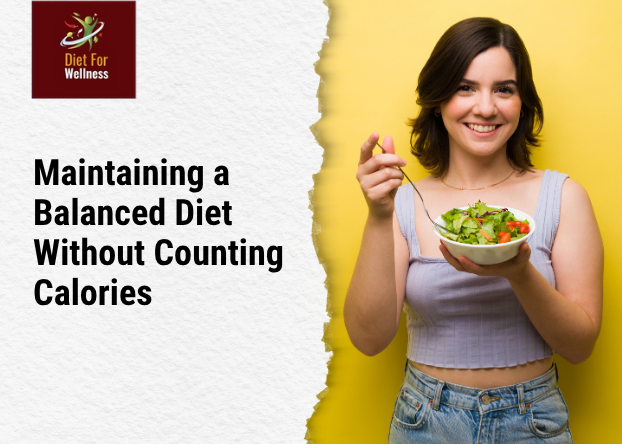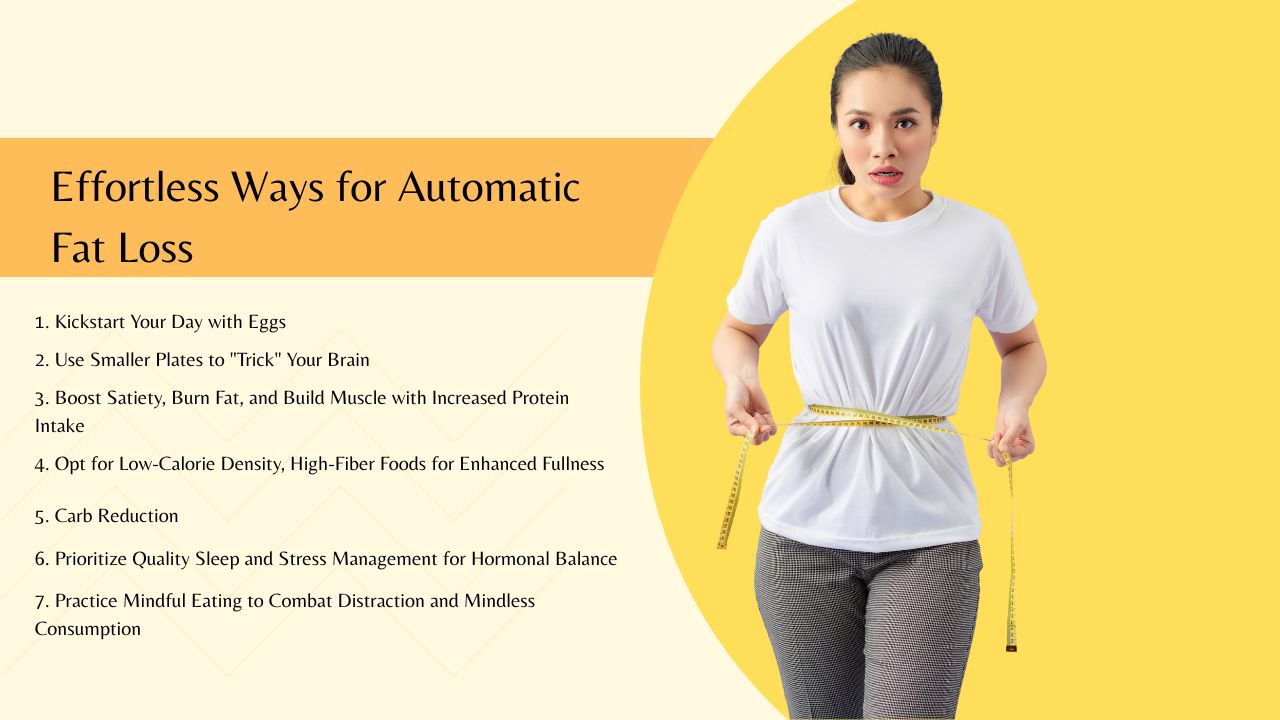Maintaining a Balanced Diet Without Counting Calories

You must have heard the classic advice- “Eat less, move more.”
While this seems logical on the surface, it’s a simplification of a much more complex reality. Weight gain and loss are not determined by calorie intake only.
The truth is, different foods impact your hunger and hormones in unique ways, meaning that not all calories are created equal. Many factors beyond simple calorie counting influence your weight.
The good news?
There are numerous effective ways you can adopt to lose weight without ever having to count a single calorie.
Effortless Ways for Automatic Fat Loss

- Kickstart Your Day with Eggs
Transforming your breakfast routine can be a remarkably simple step toward weight loss. Studies have shown that opting for eggs in the morning, instead of grain-based options, can lead to natural fat loss without conscious effort.
A study involving 30 overweight women showed that those who ate eggs for breakfast had fewer calories at lunch, throughout the rest of the day, and for the next 36 hours. The high satiety of eggs naturally led to reduced calorie intake in subsequent meals.
Beyond weight management, eggs are incredibly nutritious. Despite their cholesterol content, research suggests they don’t increase “bad” cholesterol or contribute to heart disease as once believed. And for those short on time, a quick egg and veggie breakfast can be prepared in just 5–10 minutes, simply set your alarm a few minutes earlier.
- Use Smaller Plates to “Trick” Your Brain
The human brain, a complex organ, plays a significant role in our eating habits. A clever tactic to influence your brain into feeling more satisfied with less food is to use smaller plates.
Larger plates or bowls can subconsciously make you feel like you’ve eaten less. On the contrary, smaller plates can “trick” your brain into perceiving a larger portion, leading to greater satisfaction with fewer calories. While psychologists have observed this effect, some research suggests it might be less pronounced in overweight individuals.
- Boost Satiety, Burn Fat, and Build Muscle with Increased Protein Intake
There is enough evidence that supports protein’s ability to enhance fat burning and diminish hunger, contributing to natural weight loss. Protein has a higher thermic effect than other macronutrients, meaning your body expends more calories digesting and utilizing it.
Moreover, protein significantly increases satiety, leading to reduced hunger. One study revealed that increasing protein to 30% of daily calories resulted in the participants consuming 441 fewer calories per day. Several studies confirm that higher protein intake can result in automatic weight loss, even when eating until full.
Protein also aids in muscle growth, especially when combined with resistance training. Muscle tissue is metabolically active, burning calories while at rest. Incorporating more animal-based proteins like meat, fish, and eggs into every meal is an excellent way to reduce overall calorie intake.
- Opt for Low-Calorie Density, High-Fiber Foods for Enhanced Fullness
Another effective way for feeling satisfied with fewer calories is to prioritize foods with low calorie density, such as vegetables and some fruits, which are rich in water content.
Research consistently shows that individuals who consume low-calorie density foods achieve greater weight loss than those who favor high-calorie density options. For example, a study found women who ate soup (low-calorie density) lost 50% more weight than those who consumed a calorie-dense snack.
Vegetables are also packed with soluble fiber, which has been linked to weight loss in several studies. Soluble fiber is broken down by gut bacteria, producing butyrate, a fatty acid believed to have anti-obesity effects. You can lose weight without reducing the actual volume of food you eat by selecting high-fibre, low-calorie density foods like vegetables.
- Carb Reduction
Reducing your carbohydrate intake is an excellent way to initiate weight loss without meticulously counting calories or controlling portions. Studies consistently show that people who consume fewer carbohydrates naturally eat fewer calories and lose weight with the least effort.
One study compared overweight and obese women on a low-carb diet to a calorie-restricted, low-fat diet for six months. The low-carb group, eating until they were full, lost twice as much weight compared to the calorie-restricted, low-fat group.
To effectively cut carbs, reduce or eliminate major sources like sugars, sweets, sodas, and starchy foods such as bread, pasta, and potatoes. Aiming for 100–150 grams of carbs per day can be beneficial, and for rapid weight loss, going under 50 grams per day can be highly effective.
A significant benefit of carb reduction is the lowering of insulin levels. This prompts the kidneys to shed excess sodium and water, leading to a noticeable reduction in bloating and water weight.
- Prioritize Quality Sleep and Stress Management for Hormonal Balance
Sleep and stress levels are often overlooked in discussions about health and weight, yet they are important for optimal bodily and hormonal function. Inadequate sleep is a major risk factor for obesity; one study found that short sleep duration increased the risk by 89% in children and 55% in adults.
Poor sleep can also amplify hunger and cravings by disrupting key hunger hormones like ghrelin and leptin, creating a biochemical predisposition for weight gain. Excessive stress, on the other hand, can increase cortisol levels, a hormone associated with increased belly fat accumulation and a higher risk of chronic conditions like type II diabetes and heart disease.
Therefore, making time for quality sleep and actively avoiding unnecessary stressors are vital steps for managing your weight.
- Practice Mindful Eating to Combat Distraction and Mindless Consumption
Inattentive eating is a common reason for overeating and weight gain. Being attuned to your body’s hunger and fullness cues is important. Many people struggling with weight gain or obesity eat out of habit or boredom, rather than hunger. This often occurs when simultaneously engaging in other activities like watching TV or browsing the internet.
In such situations, practicing mindful eating can be beneficial. Mindful eating is a strategy that helps differentiate between emotional eating and true hunger. It involves giving your meal your full attention, free from distractions, chewing slowly, and savoring every bite. Mindful eating not only enhances meal satisfaction but also reduces the risk of overeating and weight gain.
In a Nutshell
You can lose substantial weight without calorie counting. It’s all about making simple changes to optimize your hormones, curb hunger, and supercharge your metabolism.
